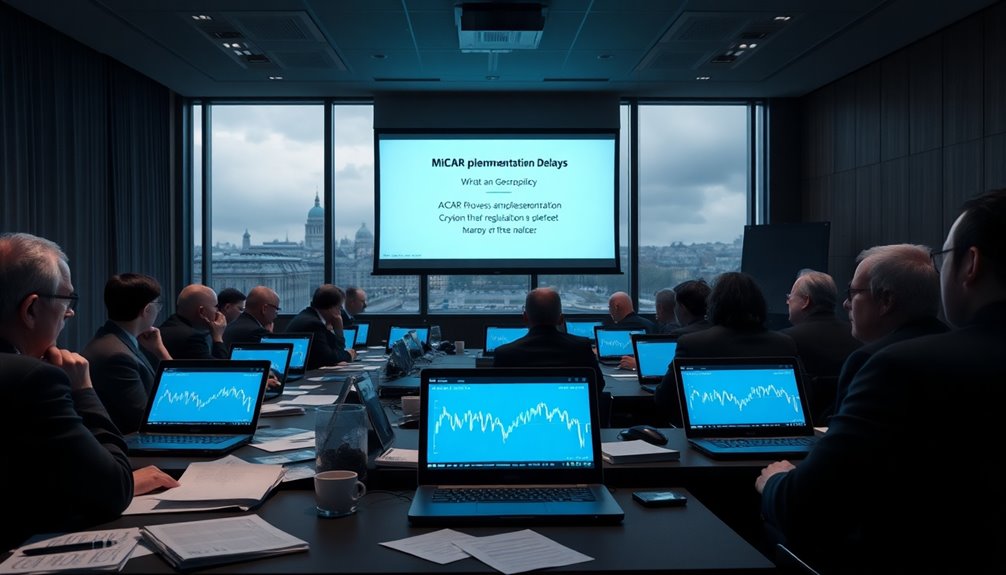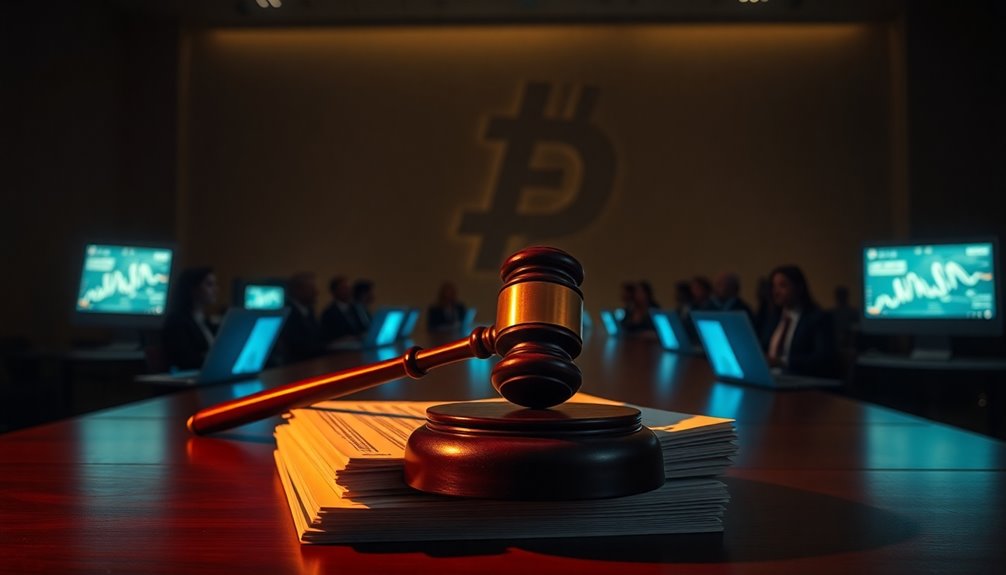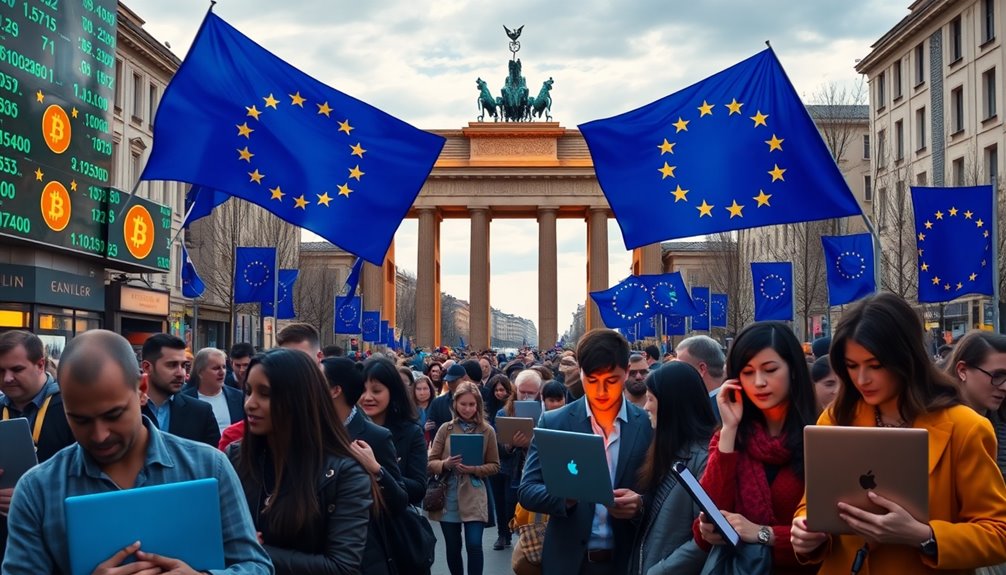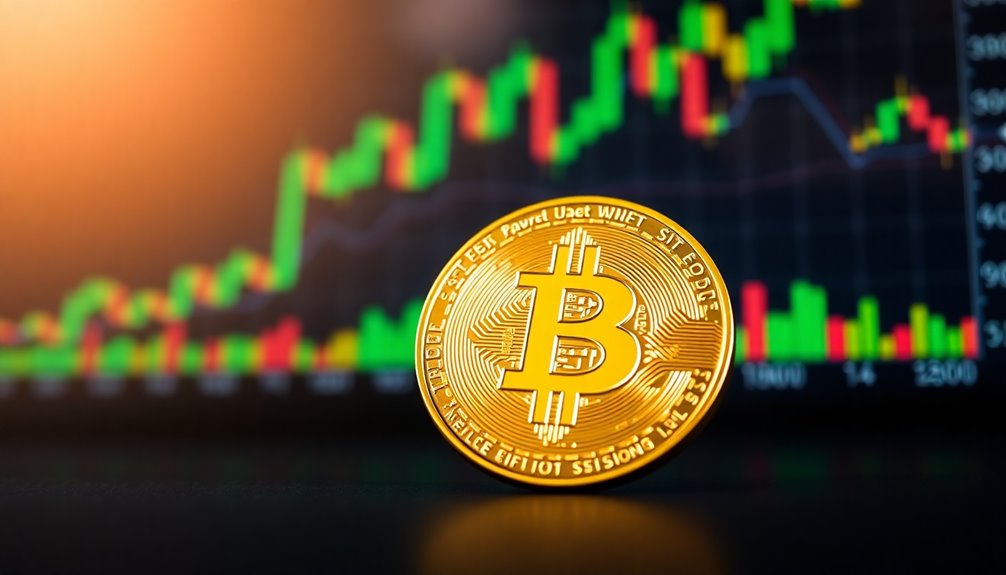Germany's Bitcoin dilemma revolves around crafting a national crypto policy that aligns regulatory compliance with innovation. You're looking at complexities like stringent licensing from BaFin and delays in implementing key regulations like MiCAR, which stifle market growth. The government's recent sale of Bitcoin also underscores the tension between regulatory actions and market reactions. Anti-Money Laundering regulations add another layer of challenge, requiring rigorous identity verification. As Germany navigates international legal intricacies, it must balance encouraging innovation with consumer protection. There's much more to explore about these ongoing challenges and their implications for Germany's crypto landscape.
Key Takeaways
- Germany's political instability has delayed crucial legislation like FinmadiG and KMAG, hindering effective implementation of the MiCA regulations for cryptocurrencies.
- BaFin's inability to issue MiCA licenses without specific laws creates uncertainty for licensed crypto companies operating in Germany.
- The government's sale of seized Bitcoin led to market volatility, highlighting tensions between regulatory actions and cryptocurrency market dynamics.
- Cross-border legal complexities complicate international cooperation on cryptocurrency fraud cases, necessitating alignment with global guidelines.
- Balancing innovation with consumer protection is essential for the future of Germany's crypto regulation, emphasizing adaptive frameworks to address market changes.
Regulatory Framework Overview

Navigating Germany's regulatory landscape for cryptocurrencies can feel daunting, but understanding the framework is essential for anyone involved in digital assets.
In Germany, cryptocurrencies are classified as financial instruments or assets, which means they're subject to laws governing securities, commodities, and investments. If you're operating a cryptocurrency exchange, you'll need to obtain a license from the Federal Financial Supervisory Authority (BaFin). BaFin oversees all exchanges, brokers, and custodians, ensuring compliance with national regulations. Licensing is required for all cryptocurrency exchanges, which further underscores the importance of adhering to the regulatory framework.
As a cryptocurrency custodian, you must hold a minimum amount of capital and adhere to Anti-Money Laundering (AML) regulations. The regulations also encompass activities such as custody, borrowing/lending, and yield/staking.
On a broader scale, the European Union's Markets in Crypto Assets (MiCA) framework aims to protect investors and promote stability, with specific licensing requirements for virtual currency exchanges and custodial wallet providers.
Additionally, strict KYC and AML procedures are in effect to mitigate fraud risks. By understanding these regulations, you can navigate the complexities of Germany's cryptocurrency landscape and ensure compliance in your operations.
MiCAR Implementation Delays

Due to political instability in Germany, the implementation of the Markets in Crypto Assets Regulation (MiCAR) has faced significant delays. The collapse of the ruling coalition has stalled essential legislation, such as the Digitalisation of the Financial Markets Act (FinmadiG) and the Supervision of Crypto Markets Act (KMAG). These laws are crucial for BaFin to issue MiCAR licenses to Crypto Asset Service Providers (CASPs). Without them, Germany risks non-compliance, which could lead to infringement proceedings from the European Commission.
You might find it alarming that, without specific national legislation, BaFin can't issue the required licenses. This leaves both new market entrants and existing financial institutions in limbo. While licensed companies can operate until a simplified authorization decision or December 31, 2025, the lack of regulatory clarity puts domestic firms at a disadvantage compared to foreign companies that are already licensed in other EU nations. Additionally, the fragmentation of the EU regulatory environment may result from Germany's inaction, further complicating the situation.
There's an urgent need for the Bundestag to prioritize passing FinmadiG and KMAG. Financial experts emphasize that swift action is essential to regain Germany's competitive edge in the digital finance sector and ensure compliance with EU standards.
Impact on Financial Markets

The political instability in Germany not only hampers regulatory progress but also has a tangible impact on financial markets, particularly Bitcoin. When the German government sold $900 million worth of Bitcoin, roughly 30,000 bitcoins, the market reacted swiftly, causing a 5% drop in prices within hours. This sale highlights the ongoing tension between regulatory bodies and cryptocurrency markets, which can further exacerbate market volatility. Additionally, the importance of effective digital asset management becomes even more pronounced during such turbulent times, as investors seek to navigate the shifting landscape. Bitcoin mining’s average time for transaction validation and the adjustments in mining difficulty could also play a role in market dynamics during periods of regulatory uncertainty. Furthermore, the decentralized nature of cryptocurrencies can lead to unpredictable market responses during regulatory actions. Bitcoin’s potential impact on the US economy cannot be understated, as the cryptocurrency market continues to grow and evolve. With Germany’s actions affecting the global market, it is crucial for regulatory bodies in the US to closely monitor and assess the impact of such events. As the popularity of Bitcoin and other cryptocurrencies rises, their influence on financial markets and the broader economy will likely become a topic of increasing concern for policymakers and investors alike. The interconnectedness of global markets means that volatility in one country can have ripple effects across the world, underscoring the need for coordinated and strategic approaches to cryptocurrency regulation.
This sale heightened existing volatility, leading to concerns about ongoing liquidation of seized Bitcoin assets, which could continue to depress prices.
Despite this initial setback, some analysts suggest that the bearish sentiment might be a short-term hiccup in an otherwise bullish market. Bitcoin had already seen a decline of over 21% from its all-time high in March 2024, yet it managed to recover partially, gaining 4.2% after the brief drop following the sale.
Germany's actions could set a precedent for other governments, influencing their management of cryptocurrency holdings. Market participants are divided; some view the sale as a strategic move, while others see it as a lack of confidence in Bitcoin's future.
This tension between regulatory bodies and the decentralized nature of cryptocurrencies adds another layer of complexity to market sentiment and stability.
Anti-Money Laundering Regulations

Germany's approach to anti-money laundering (AML) regulations is crucial for maintaining the integrity of its financial system, especially in the rapidly evolving cryptocurrency landscape. Governed by the Money Laundering Act (Geldwäschegesetz), Germany aligns its laws with international standards, including those set by the Financial Action Task Force (FATF).
If you're operating a cryptocurrency exchange or service provider, you'll need to obtain a license from the Federal Financial Supervisory Authority (BaFin), which oversees compliance with AML regulations.
To prevent money laundering and terrorist financing, you must implement Know Your Customer (KYC) procedures, verifying customer identities and assessing their risk profiles. Ongoing transaction monitoring is essential, as you'll need to report any suspicious activities to the Financial Intelligence Unit (FIU) through BaFin's reporting system. Additionally, the strict KYC and AML regulations aim to combat fraud and protect consumers.
Compliance is enforced through regular assessments and audits by regulatory bodies like BaFin and the FIU. Training programs also help foster a culture of AML compliance.
If you fail to comply, you could face fines and other penalties. By adhering to these regulations, you'll contribute to a more secure financial environment in Germany's cryptocurrency sector.
Cross-Border Legal Complexities

Navigating cross-border legal complexities in the cryptocurrency realm can be a daunting task for businesses and regulators alike. With cryptocurrency fraud cases often spanning multiple countries, the legal process becomes increasingly complicated. Different jurisdictions have varying laws and regulations regarding cryptocurrencies, making international cooperation a real challenge. You'll find that Germany must adapt its frameworks to align with emerging international guidelines to ensure consistent treatment of crypto assets.
The borderless nature of crypto assets demands international collaboration and information sharing among authorities. Legal frameworks need to be flexible enough to address the global landscape of cryptocurrency transactions and fraud effectively. Additionally, the admissibility of blockchain evidence in German courts poses another layer of complexity. Courts require judicial acknowledgment of blockchain technology's reliability, which often hinges on expert testimony. Ensuring that legal authorities grasp the nuances of this technology is no small feat.
Moreover, Germany's crypto regulations must comply with EU directives, like the Markets in Crypto Assets (MiCA) framework, to maintain consistency across member states. This regulatory alignment is crucial for fostering investor protection while still allowing for innovation in the crypto sector. In light of the dynamic nature of cryptocurrency, regulatory bodies must continuously evolve their approaches to adequately address emerging threats and opportunities in the market.
Future of Crypto Regulation

With ongoing discussions around cross-border legal complexities, the future of crypto regulation in Germany is at a pivotal point. As the implementation of the Markets in Crypto-Assets (MiCA) regulations looms, you'll notice that Germany needs complementary national legislation. This includes appointing BaFin as the licensing authority for Crypto Asset Service Providers (CASPs).
However, political instability has stalled crucial laws, leaving Germany non-compliant and at risk of infringement actions from the European Commission.
The licensing requirements under MiCA present both challenges and opportunities. All crypto-related service providers must obtain a BaFin license, ensuring compliance with consumer protection and anti-money laundering standards. Additionally, mandatory licensing will enhance investor protection through clearer disclosures.
While larger firms may adapt more easily, smaller players could find these regulations a barrier to entry, increasing operational costs and scrutiny.
Moreover, if Germany fails to implement MiCA effectively, it could face economic losses and reduced influence in the global crypto landscape.
Your focus should remain on how key regulators like BaFin aim to create a stable yet innovative environment for the crypto industry, serving as a potential model for other EU countries. The future looks promising, but timely action is essential to harness the benefits.
Balancing Innovation and Protection

Striking a balance between innovation and protection is crucial in the evolving landscape of cryptocurrency regulation. As you navigate this complex arena, you'll notice that cryptocurrencies are classified as financial instruments or assets, placing them under stringent regulations.
To operate legally, cryptocurrency exchanges must secure licenses from the Federal Financial Supervisory Authority (BaFin) and comply with the EU's Markets in Crypto Assets (MiCA) framework. The recognition of Bitcoin as a legal form of payment by Germany marks a significant shift in regulatory approach.
You'll also find that anti-money laundering (AML) and know your customer (KYC) measures are firmly in place, requiring transaction monitoring and the reporting of suspicious activities. Privacy and security are paramount, urging companies to adopt advanced measures like cold storage and multi-signature wallets.
While fostering innovation, Germany must also be cautious of the fiscal risks that cryptocurrencies pose. Granting official status to crypto assets could destabilize government finances and influence inflation rates.
Therefore, integrating crypto into existing financial regimes while ensuring clear tax treatment and compliance is essential. Ultimately, you'll see that maintaining a robust regulatory environment allows for technological advancement without stifling growth or jeopardizing financial stability.
Frequently Asked Questions
What Are the Key Benefits of Using Cryptocurrencies in Germany?
Using cryptocurrencies in Germany offers you significant advantages.
You'll benefit from tax exemptions on profits if you hold assets for over a year, making it a great long-term investment.
The regulatory framework provides stability and clarity, ensuring your rights are protected.
Plus, Germany's growing acceptance of digital currencies fosters innovation, attracting international investors and boosting the local economy.
With political support, you're likely to see a thriving environment for crypto investments.
How Can Individuals Invest in Cryptocurrencies Legally in Germany?
To invest in cryptocurrencies legally in Germany, you should start by choosing a licensed exchange that complies with BaFin regulations.
Ensure you complete the necessary KYC process and keep track of your transactions.
Be aware of the tax implications, as profits may be subject to capital gains tax.
Additionally, familiarize yourself with AML regulations to avoid issues.
Always stay updated on the evolving regulatory landscape to ensure your investments remain compliant.
What Penalties Exist for Non-Compliance With Crypto Regulations?
If you don't comply with crypto regulations, you face several penalties.
For late tax filings, you'll incur a minimum penalty of €25 per month. Late payments attract a 1% penalty on the unpaid amount monthly.
Severe cases of tax evasion could lead to hefty fines or imprisonment.
Additionally, failing to follow AML regulations can result in fines, highlighting the importance of accurate reporting and compliance in your crypto activities.
Are There Any Tax Implications for Cryptocurrency Transactions in Germany?
Yes, there are tax implications for cryptocurrency transactions in Germany.
If you hold crypto for less than a year, any profits are taxed as regular income, which could be up to 45%.
However, if you hold it for over a year, you won't face capital gains tax.
Remember, crypto mining and staking income is taxable too.
Always report your transactions to avoid penalties for non-compliance, as the tax authority closely monitors these activities.
How Do Consumers Protect Themselves From Crypto Fraud in Germany?
To protect yourself from crypto fraud in Germany, start by using reputable exchanges and wallets.
Always verify the platform's compliance with local regulations. Implement strong security measures like two-factor authentication and keep your private keys secure.
Stay informed about common scams and watch for red flags, such as unsolicited offers.
Report suspicious activities to authorities, and educate yourself about consumer protections in place to help safeguard your crypto investments.
Conclusion
Germany's approach to Bitcoin and crypto regulation is a complex balancing act. You see the challenges posed by delays in MiCAR implementation and the need for robust anti-money laundering measures. As the nation navigates cross-border legal complexities, it's crucial to foster an environment that encourages innovation while ensuring investor protection. The future of crypto regulation in Germany hinges on finding that delicate balance, making it essential for policymakers to act decisively and thoughtfully in this evolving landscape.

















